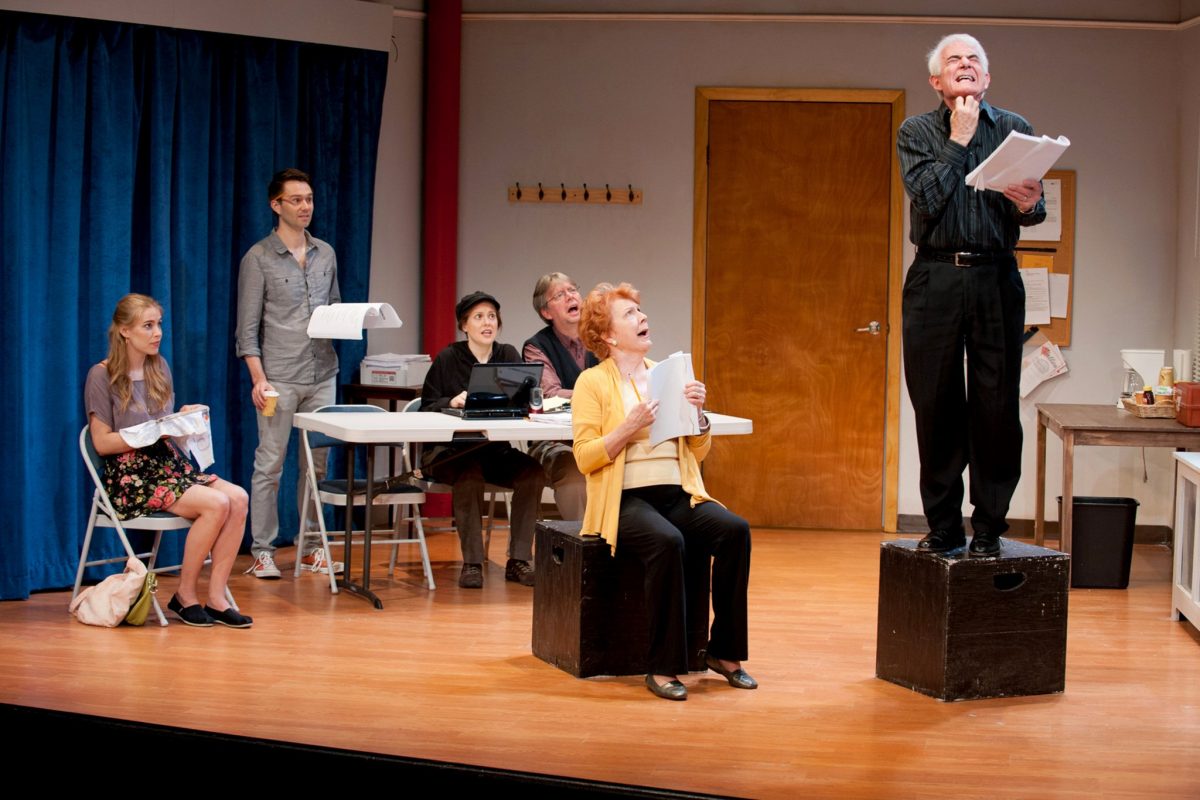As anyone who has ever ventured behind the curtain can attest, transformation lies at the heart of theater. And in Tom Dudzick’s backstage comedy “Don’t Talk to the Actors,” now at Penguin Rep Theater in Rockland County, the transformations just keep on coming.
Two innocents from upstate become Times Square habitués, savvy about the wicked ways of Broadway; a dowdy workaholic blossoms into a glamorous knockout; a bawdy, manic cutup reveals a tender side; and a sweet little family drama turns into an unhinged spectacle. Do I need to add that “Don’t Talk to the Actors” is, like the show music playing before it begins, a love song to the theater?
Mr. Dudzick, who lives in Rockland County, has become a favorite at Penguin with his easygoing autobiographical comedies. In this one, the playwright’s stand-in leaves the blue-collar precincts familiar from “Greetings!” “Over the Tavern” and “Our Lady of South Division Street” (now called “Miracle on South Division Street”) for a New York rehearsal studio, where his easygoing autobiographical play “Tuning Pianos” will be readied for its Broadway debut.
The studio, nicely rendered by the set designer, Paul Weimer, has been meticulously organized by Lucinda, “the most sought-after stage manager in New York.” As the other characters filter into the room, Mr. Dudzick outlines the back story: a chance encounter with a veteran Broadway producer has landed an amateur playwright, Jerry Przprezniak, his first professional production, and he has come to New York with his awe-struck fiancée, Arlene Wyniarski.
One of the reasons she’s so awe-struck is that the lead actor of “Tuning Pianos” is none other than Curt Logan, the television has-been with whom she was hopelessly smitten as a teenager. His TV co-star, Beatrice Pomeroy, has been rescued — a tad unwillingly — from her risqué nightclub act to play opposite him again in Jerry’s drama. And moonlighting — also a tad unwillingly — from his successful theater in Chicago is the play’s director, Mike Policzek, whose nice-guy demeanor masks an astute theatrical intelligence (even if he can’t quite wrap his brain around the fact that New York City prices are higher than Chicago’s).
Wilbur Edwin Henry’s amiable performance soft-pedals Mike’s intelligence, but the audience figures it out when early on he gives Jerry the advice that all playwrights need to hear if they are to keep faith with the characters they invent: “Don’t talk to the actors.” Mike doesn’t explain why, but Mr. Dudzick’s play does, as Curt and Beatrice, in the properly hammy performances of Richard Kline and Beth Fowler, attempt to take over Jerry’s script in the service of their egos and their careers. Curt wants to give his role more “grit,” and Bea thinks her character could use more jokes, not to speak of songs. In Mr. Dudzick’s canny, self-referential structure, Curt and Bea are not just juicing up Jerry’s play, they’re enlivening the one we’re watching as well.
The playwright has told interviewers that he based Curt on the television actor Darren McGavin, who starred in “Greetings!” Off Broadway in 1993. The director of that production was Dennis Zacek, the longtime head of the Victory Gardens Theater in Chicago. Bea is not only based on the comedian Belle Barth, she borrows some of her material. And David Arkema, the actor playing Jerry, actually bears something of a physical resemblance to Mr. Dudzick.
I have no information on whether the play’s fiancée and stage manager have real-life counterparts as well, but “Don’t Talk to the Actors” feels unmistakably like a comedy à clef. And when the “Tuning Pianos” director tells the “Tuning Pianos” playwright that he might need to cut, you wish the play’s actual director, Thomas Caruso, had persuaded Mr. Dudzick to trim some of the first act, or had at least managed to speed it up a bit.
But in some ways, the deliberate pace of Act I sets up the unraveling that provides the laughter, and also a few gasps, in Act II. And Mr. Caruso, who directed Mr. Kline and Ms. Fowler in Penguin’s “Greetings!” and Mr. Arkema in Penguin’s “Shipwrecked! An Entertainment,” has elicited some truly fine acting from his cast.
Mr. Kline is especially unctuous as the preening Curt, and Ms. Fowler deftly conveys the fragility beneath Bea’s bluster. Claire Karpen carries off Lucinda’s obsessive work ethic and jarring outfits (by the costume designer, Brendan Cooper) with panache. And Alexandra Turshen is a properly dewy ingénue as the dewy ingénue engaged to the playwright.
But it’s when Mr. Arkema arrives in the rehearsal room after an all-night rewrite session, wild-haired and wild-eyed and raving, that theater’s power to transform is fully, hilariously realized.

